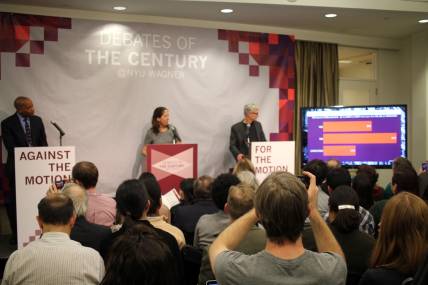Gentrification: It's complicated

Gentrification: It’s highly charged and complicated.
This was a key takeaway when author and magazine writer Michael Greenberg went toe-to-toe with Columbia University urban planning expert Lance Freeman in a thoughtful debate on Nov. 28 over the proposition, “Government Should Stop Gentrification.”
Taking on the fraught topic before a capacity audience at NYU Wagner, Greenberg argued that government has a responsibility to stop gentrification in its tracks, while Freeman contended that the government should, in some important ways, stay out of it.
Alena Samuels, staff writer for The Atlantic, was the moderator for the latest in the "Debates of the Century series" cosponsored by NYU Wagner and the Century Foundation.
Should the government seek to protect hardworking, lower-wage earners from being displaced due to the upturn of fortunes in many American cities, as Greenberg put it? Yes, he said, emphasizing the power of city governments to spur affordable housing through zoning, tax exemptions, and provision of public services, such as new schools, and to mediate "wrenching" extremes of wealth and poverty.
“The government should not stop gentrification,” countered Dr. Freeman, saying new market-rate housing can have broad, positive results. But, he said, "That doesn’t mean that governments should do nothing”– and suggested a designated tax to create affordable housing and dampen displacement. Any city would be hard-pressed at the same time to halt gentrification, considering so many people are seeing cities as attractive places to live, said Freeman.
Greenberg readily embraced the addition of a tax, perhaps in the form of a sales tax, to create affordable housing in cities like New York, where "hyper-investment," dislodgement, and homelessness have all grown. The problem with alternate approaches to the problem, like special tax abatement programs to require affordable units within new, market-rate housing, is that they can often end up touching off gentrification and displacement throughout the surrounding neighborhood. Even public/private partnerships in affordable housing development rarely work: "Developers demand way too much, the city capitulates, and designated affordable units are often more expensive than the people in those neighborhoods are used to paying or can pay,” he said.
Dr. Freeman responded, “I agree with a lot of sentiment that Michael is expressing regarding some of the problems that happen..." and mentioned the need for government to take active steps to preserve affordable units. But, he contended, discouraging market-rate housing in lower-income areas across the board is not the wisest public policy to follow.
“People want to move into the city, it’s driving gentrification,” Freeman said. If we don't build the market-rate housing, then “where are those people going to go? They will eventually look for housing that is currently occupied by moderate-income households….It won’t necessarily stop the problem; it might indeed accelerate gentrification in some neighborhoods.”
To read more about gentrification, see Greenberg’s recent piece in the New York Review of Books, “Tenants Under Siege,” or Freeman’s book, There Goes the ‘Hood.